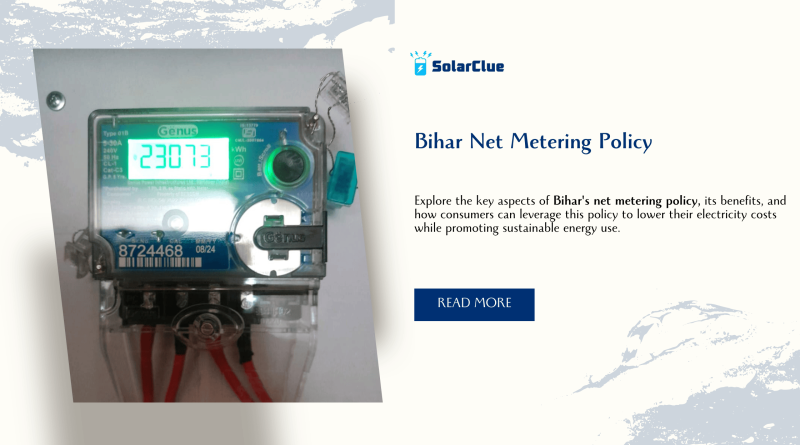Bihar Net Metering Policy
Bihar, with its abundant sunlight, has taken significant steps to promote renewable energy, particularly through its Net Metering Policy. The Bihar government aims to encourage the adoption of solar energy by allowing consumers to install rooftop solar systems and export excess electricity back to the grid. This not only helps reduce electricity bills but also contributes to a cleaner, greener environment by reducing the dependency on conventional energy sources.
In this blog, we will explore the key aspects of Bihar’s net metering policy, its benefits, and how consumers can leverage this policy to lower their electricity costs while promoting sustainable energy use.
Table of Contents
- 1 What is Net Metering?
- 1.1 Key Features of Bihar’s Net Metering Policy
- 1.2 1. Eligibility Criteria
- 1.3 2. Solar System Capacity
- 1.4 3. Billing and Settlement
- 1.5 4. Installation and Maintenance
- 1.6 5. Government Subsidies and Incentives
- 1.7 Benefits of Net Metering in Bihar
- 1.8 1. Reduced Electricity Bills
- 1.9 2. Environmental Impact
- 1.10 3. Energy Independence
- 1.11 4. Long-Term Financial Savings
- 1.12 5. Government Incentives
- 2 Key Highlights of Bihar’s Net Metering Policy
- 3 How to Apply for Net Metering in Bihar
- 4 Estimated Cost of Installing a Solar System in Bihar
- 5 Conclusion
What is Net Metering?
Net metering is a system where consumers with solar rooftop systems can generate their own electricity and connect their system to the grid. When the solar system produces more electricity than the consumer uses, the excess energy is sent to the grid. The consumer earns credits for this exported energy, which can be used to offset future electricity consumption.
The Bihar Electricity Regulatory Commission (BERC) regulates the net metering policy in the state. This policy applies to both residential and commercial consumers, enabling them to reduce their electricity bills and support Bihar’s renewable energy goals.
Key Features of Bihar’s Net Metering Policy
1. Eligibility Criteria
Consumer Types: Residential, commercial, industrial, and institutional consumers are eligible to participate in the net metering program.
System Size: The policy applies to rooftop solar systems ranging from 1 kW to 1 MW in capacity.
Connection Type: Consumers must be connected to the grid through Bihar State Power Holding Company Limited (BSPHCL), which includes North Bihar Power Distribution Company Limited (NBPDCL) and South Bihar Power Distribution Company Limited (SBPDCL).
2. Solar System Capacity
The capacity of the rooftop solar system must not exceed the sanctioned load or contract demand of the consumer’s existing connection.
The maximum allowed solar system size is 1 MW, but for residential consumers, the system size is typically within 1 kW to 500 kW.
3. Billing and Settlement
A bi-directional meter is used to track both the energy consumed from the grid and the energy exported to the grid.
Consumers are billed for the net energy consumed, calculated as the difference between the energy imported and exported.
Settlement Period: The billing cycle for energy credits is monthly. Any excess credits can be carried forward to the next billing cycle. At the end of the financial year, any unutilized credits may lapse.
4. Installation and Maintenance
Consumers are responsible for the cost of installing the solar rooftop system.
The maintenance of the solar system, including periodic cleaning and technical checks, is also the consumer’s responsibility.
Solar systems must be installed by approved vendors to ensure compliance with the safety and technical standards of Bihar’s distribution companies.
5. Government Subsidies and Incentives
The Ministry of New and Renewable Energy (MNRE) offers subsidies for solar rooftop installations, with a 40% subsidy for systems up to 3 kW and 20% for systems between 3 kW and 10 kW.
Bihar also promotes the adoption of solar energy through state-level incentives, making it easier for consumers to switch to renewable energy.
Benefits of Net Metering in Bihar
1. Reduced Electricity Bills
By generating their own electricity, consumers can lower their dependency on grid power. Any excess energy generated is exported to the grid, earning credits that reduce future electricity bills. Over time, this results in substantial savings.
2. Environmental Impact
Bihar’s net metering policy promotes the use of clean, renewable energy, which helps reduce carbon emissions. Solar power generation helps decrease the state’s dependence on fossil fuels, contributing to a greener environment.
3. Energy Independence
Net metering allows consumers to produce their own electricity, making them less dependent on the grid. This is particularly beneficial in areas prone to power outages or where electricity prices are rising.
4. Long-Term Financial Savings
Though the initial investment in solar systems can be high, the payback period is typically between 5 to 8 years. Once the system has paid for itself, consumers can enjoy free electricity for the remaining life of the system, which can last up to 25 years.
5. Government Incentives
In addition to central government subsidies, Bihar offers state-level incentives for consumers to adopt solar power. These incentives make it more affordable for both residential and commercial consumers to switch to renewable energy.
Key Highlights of Bihar’s Net Metering Policy
| Aspect | Details |
|---|---|
| Eligible Consumers | Residential, Commercial, Industrial, Institutional |
| System Size | 1 kW to 1 MW |
| Maximum Solar Capacity | Up to 100% of sanctioned load |
| Billing Mechanism | Net metering with a bi-directional meter |
| Excess Energy Settlement | Monthly credit for surplus energy, carried forward to the next billing cycle |
| Meter Type | Bi-directional meter to track both import and export of energy |
| Subsidies | Up to 40% for systems up to 3 kW, 20% for systems between 3 kW and 10 kW |
| Connection | Must be connected to BSPHCL (NBPDCL or SBPDCL) grid |
| Settlement Period | Monthly, with carryover of energy credits to the next billing cycle |
| Energy Credit Validity | Unutilized credits may lapse at the end of the financial year |
| Maintenance | Consumer is responsible for system maintenance |
| Government Incentives | MNRE and state-level subsidies available |
| Environmental Benefits | Reduces carbon emissions, promotes the use of clean energy |
How to Apply for Net Metering in Bihar
1. Check Eligibility
Make sure your residential, commercial, or industrial property qualifies for net metering under Bihar’s policy. The size of the solar system should not exceed your sanctioned load or contract demand.
2. Select an Approved Vendor
Choose an approved solar vendor who meets the technical standards set by Bihar’s distribution companies. Ensure that the installer is experienced and certified for rooftop solar installations in Bihar.
3. Submit Application for Net Metering
Submit an application for net metering to BSPHCL through either NBPDCL or SBPDCL depending on your location. Applications are available online or at the respective local offices.
4. Install Bi-Directional Meter
A bi-directional meter is required to measure both the electricity consumed from the grid and the electricity exported back to the grid.
5. Inspection and Approval
Once the system is installed, BSPHCL will inspect it to ensure compliance with technical standards. After approval, the system will be connected to the grid, and you can begin generating solar power.
6. Start Generating Energy
Once your system is connected, you can start generating electricity. Any excess electricity that is exported to the grid will earn you credits, which will reduce your future electricity bills.
Estimated Cost of Installing a Solar System in Bihar
The cost of setting up a solar power system under net metering in Bihar depends on the size of the system, equipment quality, and installation costs. Below is an estimated cost breakdown for 1 kW, 3 kW, and 5 kW systems.
Estimated Cost for Solar System Installation in Bihar
| Component | 1 kW System | 3 kW System | 5 kW System |
|---|---|---|---|
| Solar Panels | ₹25,000 – ₹40,000 | ₹75,000 – ₹1,20,000 | ₹1,25,000 – ₹2,00,000 |
| Inverter | ₹6,000 – ₹12,000 | ₹18,000 – ₹36,000 | ₹30,000 – ₹60,000 |
| Bi-Directional Meter | ₹5,000 – ₹10,000 | ₹5,000 – ₹10,000 | ₹5,000 – ₹10,000 |
| Mounting Structure | ₹1,500 – ₹3,000 | ₹4,500 – ₹9,000 | ₹7,500 – ₹15,000 |
| Wiring and Cabling | ₹2,000 – ₹4,000 | ₹6,000 – ₹12,000 | ₹10,000 – ₹20,000 |
| Installation and Labor | ₹5,000 – ₹8,000 | ₹10,000 – ₹15,000 | ₹15,000 – ₹25,000 |
| Total Estimated Cost | ₹44,500 – ₹77,000 | ₹1,18,500 – ₹2,02,000 | ₹1,92,500 – ₹3,30,000 |
Conclusion
Bihar’s net metering policy offers a cost-effective and sustainable way for consumers to generate their own electricity and reduce their dependency on the grid. By adopting rooftop solar systems, consumers can enjoy long-term financial savings, contribute to environmental protection, and take advantage of government incentives.
Ready to Save on Electricity Bills with Solar Power?
With Net Metering, you can drastically reduce your electricity costs by generating your own solar power and sending any excess back to the grid. It’s time to harness the sun’s energy and make a positive impact on both your wallet and the environment!
At SolarClue, we make the transition to solar simple, efficient, and affordable. Whether you’re a homeowner, business, or institution, our team of solar experts will guide you through the process—from installation to maintenance—so you can start saving from day one.
🌞 Take the first step towards energy independence today!
🔋 Get your solar consultation now!
Contact SolarClue or call us at +91-888-4444-830 to explore the best solar solutions for your home or business.
Go Solar. Save More. Power Your Future with SolarClue!



